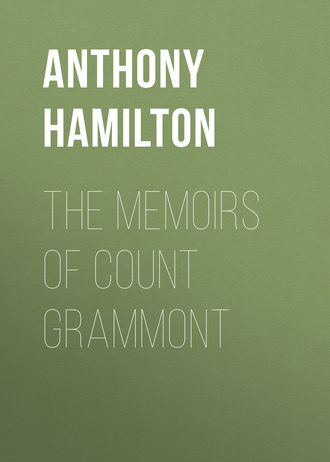 полная версия
полная версияThe Memoirs of Count Grammont
The Duchess of Savoy gave the very next day an entertainment at La Venerie, where all the ladies were invited.
The Chevalier was so agreeable and diverting, that he made his mistress almost die with laughing. Matta, in leading his lady to the coach, squeezed her hand, and at their return from the promenade he begged of her to pity his sufferings. Thus was proceeding rather too precipitately, and although Madame de Senantes was not destitute of the natural compassion of her sex, she nevertheless was shocked at the familiarity of this treatment; she thought herself obliged to show some degree of resentment, and pulling away her hand, which he had pressed with still greater fervency upon this declaration, she went up to the royal apartments without even looking at her new lover. Matta, never thinking that he had offended her, suffered her to go, and went in search of some company to sup with him: nothing was more easy for a man of his disposition; he soon found what he wanted, sat a long time at table to refresh himself after the fatigue, of love, and went to bed completely satisfied that he had performed his part to perfection.
During all this time the Chevalier de Grammont acquitted himself towards Mademoiselle de Saint Germain with universal applause; and without remitting his assiduities, he found means to shine, as they went along, in the relation of a thousand entertaining anecdotes, which he introduced in the general conversation. Her Royal Highness heard them with pleasure, and the solitary Senantes likewise attended to them. He perceived this, and quitted his mistress to inquire what she had done with Matta.
“I” said she, “I have done nothing with him; but I don’t know what he would have done with me if I had been obliging enough to listen to his most humble solicitations.”
She then told him in what manner his friend had treated her the very second day of their acquaintance.
The Chevalier could not forbear laughing at it: he told her Matta was rather too unceremonious, but yet she would like him better as their intimacy more improved, and for her consolation he assured her that he would have spoken in the same manner to her Royal Highness herself; however, he would not fail to give him a severe reprimand. He went the next morning into his room for that purpose; but Matta had gone out early in the morning on a shooting party, in which he had been engaged by his supper companions in the preceding evening. At his return he took a brace of partridges and went to his mistress. Being asked whether he wished to see the Marquis, he said no; and the Swiss telling him his lady was not at home, he left his partridges, and desired him to present them to his mistress from him.
The Marchioness was at her toilet, and was decorating her head with all the grace she could devise to captivate Matta, at the moment he was denied admittance: she knew nothing of the matter; but her husband knew every particular. He had taken it in dudgeon that the first visit was not paid to him, and as he was resolved that it should not be paid to his wife, the Swiss had received his orders, and had almost been beaten for receiving the present which had been left. The partridges, however, were immediately sent back, and Matta, without examining into the cause, was glad to have them again. He went to court without ever changing his clothes, or in the least considering he ought not to appear there without his lady’s colours. He found her becomingly dressed; her eyes appeared to him more than usually sparkling, and her whole person altogether divine. He began from that day to be much pleased with himself for his complaisance to the Chevalier de Grammont; however, he could not help remarking that she looked but coldly upon him. This appeared to him a very extraordinary return for his services, and, imagining that she was unmindful of her weighty obligations to him, he entered into conversation with her, and severely reprimanded her for having sent back his partridges with so much indifference.
She did not understand what he meant; and highly offended that he did not apologize, after the reprimand which she concluded him to have received, told him that he certainly had met with ladies of very complying dispositions in his travels, as he seemed to give to himself airs that she was by no means accustomed to endure. Matta desired to know wherein he could be said to have given himself any. “Wherein?” said she: “the second day that you honoured me with your attentions, you treated me as if I had been your humble servant for a thousand years; the first time that I gave you my hand you squeezed it as violently as you were able. After this commencement of your courtship, I got into my coach, and you mounted your horse; but instead of riding by the side of the coach, as any reasonable gallant would have done, no sooner did a hare start from her form, than you immediately galloped full speed after her; having regaled yourself, during the promenade, by taking snuff, without ever deigning to bestow a thought on me, the only proof you gave me, on your return, that you recollected me, was by soliciting me to surrender my reputation in terms polite enough, but very explicit. And now you talk to me of having been shooting of partridges and of some visit or other, which, I suppose, you have been dreaming of, as well as of all the rest.”
The Chevalier de Grammont now advanced, to the interruption of this whimsical dialogue. Matta was rebuked for his forwardness, and his friend took abundant pains to convince him that his conduct bordered more upon insolence than familiarity. Matta endeavoured to exculpate himself, but succeeded ill. His mistress took compassion upon him, and consented to admit his excuses, for the manner, rather than his repentance for the fact, and declared that it was the intention alone which could either justify or condemn, in such cases; that it was very easy to pardon those transgressions which arise from excess of tenderness, but not such as proceeded from too great a presumption of success. Matta swore that he only squeezed her hand from the violence of his passion, and that he had been driven, by necessity, to ask her to relieve it; that he was yet a novice in the arts of solicitation; that he could not possibly think her more worthy of his affection, after a month’s service, than at the present moment; and that he entreated her to cast away an occasional thought upon him when her leisure admitted. The Marchioness was not offended, she saw very well that she must require an implicit conformity to the established rule of decorum, when she had to deal with such a character; and the Chevalier de Grammont, after this sort of reconciliation, went to look after his own affair with Mademoiselle de St. Germain.
His concern was not the offspring of mere good nature, nay, it was the reverse; for no sooner did he perceive that the Marchioness looked with an eye of favour upon him, than this conquest, appearing to him to be more easy than the other, he thought it was prudent to take advantage of it, for fear of losing the opportunity, and that he might not have spent all his time to no purpose, in case he should prove unsuccessful with the little St. Germain.
In the mean time, in order to maintain that authority which he had usurped over the conduct of his friend, he, that very evening, notwithstanding what had been already said, reprimanded him for presuming to appear at court in his morning suit, and without his mistress’s badge; for not having had the wit or prudence to pay his first visit to the Marquis de Senantes, instead of consuming his time, to no purpose, in inquiries for the lady; and, to conclude, he asked him what the devil he meant by presenting her with a brace of miserable red partridges. “And why not?” said Matta: “ought they to have been blue, too, to match the cockade and sword-knots you made me wear the other day? Plague not me with your nonsensical whimsies: my life on it, in one fortnight your equal in foppery and folly will not be found throughout the confines of Turin; but, to reply to your questions, I did not call upon Monsieur de Senantes, because I had nothing to do with him, and because he is of a species of animals which I dislike, and always shall dislike: as for you, you appear quite charmed with being decked out in green ribands, with writing letters to your mistress, and filling your pockets with citrons, pistachios, and such sort of stuff, with which you are always cramming the poor girl’s mouth, in spite of her teeth: you hope to succeed by chanting ditties composed in the days of Corisande and of Henry IV., which you will swear yourself have made upon her: happy in practising the ceremonials of gallantry, you have no ambition for the essentials. Very well: every one has a particular way of acting, as well as a particular taste: your’s is to trifle in love; and, provided you can make Mademoiselle de St. Germain laugh, you are satisfied: as for my part, I am persuaded, that women here are made of the same materials as in other places; and I do not think that they can be mightily offended, if one sometimes leaves off trifling, to come to the point: however, if the Marchioness is not of this way of thinking, she may e’en provide herself elsewhere; for I can assure her, that I shall not long act the part of her squire.”
This was an unnecessary menace; for the Marchioness in reality liked him very well, was nearly of the same way of thinking herself, and wished for nothing more than to put his gallantry to the test. But Matta proceeded upon a wrong plan; he had conceived such an aversion for her husband, that he could not prevail upon himself to make the smallest advance towards his good graces. He was given to understand that he ought to begin by endeavouring to lull the dragon to sleep, before he could gain possession of the treasure; but this was all to no purpose, though, at the same time, he could never see his mistress but in public. This made him impatient, and as he was lamenting his ill-fortune to her one day: “Have the goodness, madam,” said he, “to let me know where you live: there is never a day that I do not call upon you, at least, three or four times, without ever being blessed with a sight of you.” “I generally sleep at home,” replied she, laughing; “but I must tell you, that you will never find me there, if you do not first pay a visit to the Marquis: I am not mistress of the house. I do not tell you,” continued she, “that he is a man whose acquaintance any one would very impatiently covet for his conversation: on the contrary, I agree that his humour is fantastical, and his manners not of the pleasing cast; but there is nothing so savage and inhuman, which a little care, attention, and complaisance may not tame into docility. I must repeat to you some verses upon the subject: I have got them by heart, because they contain a little advice, which you may accommodate, if you please, to your own case.”
RONDEAU. Keep in mind these maxims rare, You who hope to win the fair; Who are, or would esteemed be, The quintessence of gallantry. That fopp’ry, grinning, and grimace, And fertile store of common-place; That oaths as false as dicers swear, And Wry teeth, and scented hair; That trinkets, and the pride of dress, Can only give your scheme success. Keep in mind. Has thy charmer e’er an aunt? Then learn the rules of woman’s cant, And forge a tale, and swear you read it, Such as, save woman, none would credit Win o’er her confidante and pages By gold, for this a golden age is; And should it be her wayward fate, To be encumbered with a mate, A dull, old dotard should he be, That dulness claims thy courtesy. Keep in mind.
“Truly,” said Matta, “the song may say what it pleases, but I cannot put it in practice: your husband is far too exquisite a monster for me. Why, what a plaguey odd ceremony do you require of us in this country, if we cannot pay our compliments to the wife without being in love with the husband!”
The Marchioness was much offended at this answer; and as she thought she had done enough in pointing out to him the path which would conduct him to success, if he had deserved it, she did not think it worth while to enter into any farther explanation; since he refused to cede, for her salve, so trilling an objection: from this instant she resolved to have done with him.
The Chevalier de Grammont had taken leave of his mistress nearly at the same time: the ardour of his pursuit was extinguished. It was not that Mademoiselle de Saint Germain was less worthy than hitherto of his attentions: on the contrary her attractions visibly increased: she retired to her pillow with a thousand charms, and ever rose from it with additional beauty the phrase of increasing in beauty as she increased in years seemed to have been purposely made for her. The Chevalier could not deny these truths, but yet he could not find his account in them: a little less merit, with a little less discretion, would have been more agreeable. He perceived that she attended to him with pleasure, that she was diverted with his stories as much as he could wish, and that she received his billets and presents without scruple; but then he also discovered that she did not wish to proceed any farther. He had exhausted every species of address upon her, and all to no purpose: her attendant was gained: her family, charmed with the music of his conversation and his great attention, were never happy without him: in short, he had reduced to practice the advice contained in the Marchioness’s song, and everything conspired to deliver the little Saint Germain into his hands, if the little Saint Germain had herself been willing: but alas! she was not inclined. It was in vain he told her the favour he desired would cost her nothing; and that since these treasures were rarely comprised in the fortune a lady brings with her in marriage, she would never find any person, who, by unremitting tenderness, unwearied attachment, and inviolable secrecy, would prove more worthy of them than himself. He then told her no husband was ever able to convey a proper idea of the sweets of love, and that nothing could be more different than the passionate fondness of a lover, always tender, always affectionate, yet always respectful, and the careless indifference of a husband.
Mademoiselle de Saint Germain, not wishing to take the matter in a serious light, that she might not be forced to resent it, answered, that since it was generally the custom in her country to marry, she thought it was right to conform to it, without entering into the knowledge of those distinctions, and those marvellous particulars, which she did not very well understand, and of which she did not wish to have any further explanation; that she had submitted to listen to him this one time, but desired he would never speak to her again in the same strain, since such sort of conversation was neither entertaining to her, nor could be serviceable to him. Though no one was ever more facetious than Mademoiselle de Saint Germain, she yet knew how to assume a very serious air, when ever occasion required it. The Chevalier de Grammont soon saw that she was in earnest; and finding it would cost him a great deal of time to effect a change in her sentiments, he was so far cooled in this pursuit, that he only made use of it to hide the designs he had upon the Marchioness de Senantes.
He found this lady much disgusted at Matta’s want of complaisance; and his seeming contempt for her erased every favourable impression which she had once entertained for him. While she was in this humour, the Chevalier told her that her resentment was just; he exaggerated the loss which his friend had sustained; he told her that her charms were a thousand times superior to those of the little Saint Germain, and requested that favour for himself which his friend did not deserve. He was soon favourably heard upon this topic; and as soon as they were agreed, they consulted upon two measures necessary to be taken, the one to deceive her husband, the other his friend, which was not very difficult: Matta was not at all suspicious: and the stupid Senantes, towards whom the Chevalier had already behaved as Matta had refused to do, could not be easy without him. This was much more than was wanted; for as soon as ever the Chevalier was with the Marchioness, her husband immediately joined them out of politeness; and on no account would have left them alone together, for fear they should grow weary of each other without him.
Matta, who all this time was entirely ignorant that he was disgraced, continued to serve his mistress in his own way. She had agreed with the Chevalier de Grammont, that to all appearance everything should be carried on as before; so that the court always believed that the Marchioness only thought of Matta, and that the Chevalier was entirely devoted to Mademoiselle de Saint Germain.
There were very frequently little lotteries for trinkets: the Chevalier de Grammont always tried his fortune, and was sometimes fortunate; and under pretence of the prizes he had won, he bought a thousand things which he indiscreetly gave to the Marchioness, and which she still more indiscreetly accepted: the little Saint Germain very seldom received any thing. There are meddling whisperers everywhere: remarks were made upon these proceedings; and the same person that made them communicated them likewise to Mademoiselle de Saint Germain. She pretended to laugh, but in reality was piqued. It is a maxim religiously observed by the fair sex, to envy each other those indulgences which themselves refuse. She took this very ill of the Marchioness. On the other hand, Matta was asked if he was not old enough to make his own presents himself to the Marchioness de Senantes, without sending them by the Chevalier de Grammont. This roused him; for of himself, he would never have perceived it: his suspicions, however, were but slight, and he was willing to have them removed. “I must confess,” said he to the Chevalier de Grammont, “that they make love here quite in a new style; a man serves here without reward: he addresses himself to the husband when he is in love with the wife, and makes presents to another man’s mistress, to get into the good graces of his own. The Marchioness is much obliged to you for – ”
“It is you who are obliged,” replied the Chevalier, “since thus was done on your account: I was ashamed to find you had never yet thought of presenting her with any trifling token of your attention: do you know that the people of this court have such extraordinary notions, as to think that it is rather owing to inadvertency that you never yet have had the spirit to make your mistress the smallest present? For shame! how ridiculous it is, that you can never think for yourself?”
Matta took this rebuke, without making any answer, being persuaded that he had in some measure deserved it: besides, he was neither sufficiently jealous, nor sufficiently amorous, to think any more of it; however, as it was necessary for the Chevalier’s affairs that Matta should be acquainted with the Marquis de Senantes, he plagued him so much about it, that at last he complied. His friend introduced him, and his mistress seemed pleased with this proof of complaisance, though she was resolved that he should gain nothing by it; and the husband, being gratified with a piece of civility which he had long expected, determined, that very evening, to give them a supper at a little country seat of his, on the banks of the river, very near the city.
The Chevalier de Grammont answering for them both, accepted the offer; and as this was the only one Matta would not have refused from the Marquis, he likewise consented. The Marquis came to convey them in his carriage at the hour appointed; but he found only Matta. The Chevalier had engaged himself to play, on purpose that they might go without him: Matta was for waiting for him, so great was his fear of being left alone with the Marquis; but the Chevalier having sent to desire them to go on before, and that he would be with them as soon as he had finished his game, poor Matta was obliged to set out with the man who, of all the world, was most offensive to him. It was not the Chevalier’s intention quickly to extricate Matta out of this embarrassment: he no sooner knew that they were gone, than he waited on the Marchioness, under pretence of still finding her husband, that they might all go together to supper.
The plot was in a fair way; and as the Marchioness was of opinion that Matta’s indifference merited no better treatment from her, she made no scruple of acting her part in it: she therefore waited for the Chevalier de Grammont with intentions so much the more favourable, as she had for a long time expected him, and had some curiosity to receive a visit from him in the absence of her husband. We may therefore suppose that this first opportunity would not have been lost, if Mademoiselle de Saint Germain had not unexpectedly come in, almost at the same time with the Chevalier.
She was more handsome and more entertaining that day than she had ever been before; however, she appeared to them very ugly and very tiresome: she soon perceived that her company was disagreeable, and being determined that they should not be out of humour with her for nothing, after having passed above a long half hour in diverting herself with their uneasiness, and in playing a thousand monkey tricks, which she plainly saw could never be more unseasonable, she pulled off her hood, scarf, and all that part of her dress which ladies lay aside, when in a familiar manner they intend to pass the day anywhere. The Chevalier de Grammont cursed her in his heart, while she continued to torment him for being in such ill-humour in such good company: at last the Marchioness, who was as much vexed as he was, said rather drily that she was obliged to wait on her Royal Highness: Mademoiselle de Saint Germain told her that she would have the honour to accompany her, if it would not be disagreeable: she took not the smallest notice of her offer; and the Chevalier, finding that it would be entirely useless to prolong his visit at that time, retired with a good grace.
As soon as he had left the house, he sent one of his scouts to desire the Marquis to sit down to table with his company without waiting for him, because the game might not perhaps be finished as soon as he expected, but that he would be with him before supper was over. Having despatched this messenger, he placed a sentinel at the Marchioness’s door, in hopes that the tedious Saint Germain might go out before her; but this was in vain, for his spy came and told him, after an hour’s impatience and suspense, that they were gone out together. He found there was no chance of seeing her again that day, everything falling out contrary to his wishes; he was forced therefore to leave the Marchioness, and go in quest of the Marquis.
While these things were going on in the city, Matta was not much diverted in the country: as he was prejudiced against the Marquis, all that he said displeased him: he cursed the Chevalier heartily for the tete-a-tete which he had procured him; and he was upon the point of going away, when he found that he was to sit down to supper without any other company.
However, as his host was very choice in his entertainments, and had the best wine and the best cook in all Piedmont, the sight of the first course appeased him; and eating most voraciously, without paying any attention to the Marquis, he flattered himself that the supper would end without any dispute; but he was mistaken.
When the Chevalier de Grammont was at first endeavouring to bring about an intercourse between the Marquis and Matta, he had given a very advantageous character of the latter, to make the former more desirous of his acquaintance; and in the display of a thousand other accomplishments, knowing what an infatuation the Marquis had for the very name of erudition, he assured him that Matta was one of the most learned men in Europe.
The Marquis, therefore, from the moment they sat down to supper, had expected some stroke of learning from Matta, to bring his own into play; but he was much out in his reckoning; no one had read less, no one thought less, and no one had ever spoken so little at an entertainment as he had done as he did not wish to enter into conversation, he opened his mouth only to eat, or ask for wine.
The other, being offended at a silence which appeared to him affected, and wearied with having uselessly attacked him upon other subjects, thought he might get something out of him by changing the discourse of love and gallantry; and therefore, to begin the subject, he accosted him in this manner:









